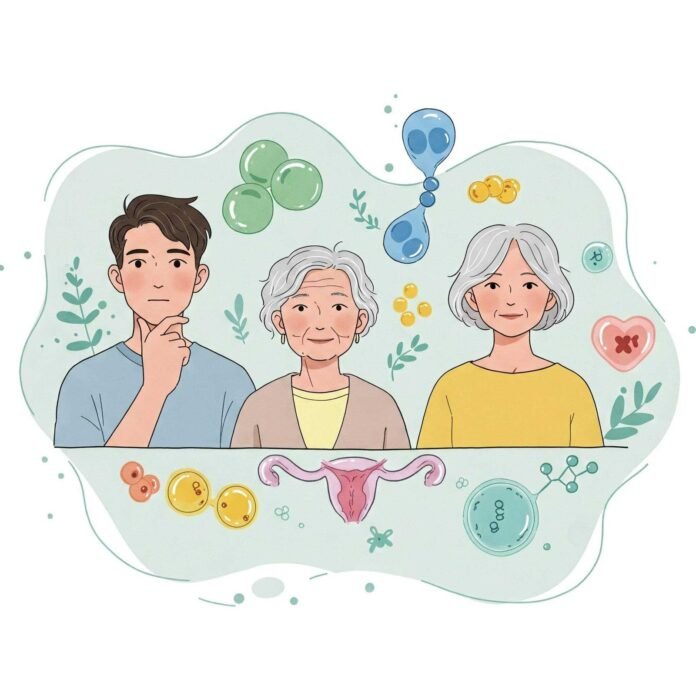Signs of hormonal imbalance have been messing with me big time, and lemme tell ya, dealing with this in India is like trying to meditate in a monsoon. I’m writing this in my cramped Mumbai flat, the air thick with curry spices and the fan creaking like it’s got a personal vendetta. I’m exhausted, like, why am I tearing up over a stray cat outside tired. My hormones are staging a full-on rebellion, and as an American fumbling through life here, I’m just trying to keep up. I’m no expert—hell, I barely know what’s going on half the time—but here’s my raw, slightly embarrassing take on it.
Why Hormonal Imbalance Feels Like My Body’s Playing Me
Hormone issues are like that friend who ghosts you then shows up unannounced. One minute I’m fine, the next I’m snapping at the vegetable vendor for no reason. I started noticing signs of hormonal imbalance a few months back. My skin, which I used to brag about, turned into a warzone—acne popping up like uninvited guests on my forehead. And the fatigue? Oh man, dragging myself through Mumbai’s chaotic streets, dodging scooters and street dogs, only to collapse on my couch like I ran a marathon. Mood swings? Don’t even. I cried during a Bollywood movie trailer last week, and I didn’t even understand the dialogue.
I read on Healthline that signs of hormonal imbalance include stuff like acne, fatigue, mood swings, and irregular periods. Yup, I’m basically a walking checklist. It’s like my body’s throwing a tantrum, and I’m just trying not to lose it.

My Cringe-Worthy Hormonal Wake-Up Call
Okay, real talk—my lowest moment was at a cafe in Colaba. I was sipping overpriced chai, trying to act all cultured, when I got so irritable I snapped at the waiter for bringing me cold samosas. Cold samosas! Like, who even am I? I apologized like crazy, but that’s when I knew my hormonal issues were out of control. Later that night, surrounded by empty chai cups and the hum of my neighbor’s late-night karaoke, I Googled “signs of hormonal imbalance” on my creaky laptop. Spoiler: I wasn’t just being dramatic.
Living in India’s chaos doesn’t help. The constant honking, the spicy street food I can’t resist (pani puri, I’m looking at you), and my nonexistent sleep schedule are basically a recipe for hormonal disaster. I was eating way too much fried stuff and not enough, like, actual nutrients. My body was screaming, “Yo, fix this!”
Hormonal Imbalance Symptoms I Totally Ignored
Here’s what I missed at first, cause I’m apparently oblivious:
- Hair drama: My hair’s falling out like it’s auditioning for a horror movie. I blamed Mumbai’s humidity, but nope—hormone issues.
- Brain fog: I forgot my landlord’s name while he was standing in front of me. Mortifying? Yes. Hormonal? Also yes.
- Sleep woes: I’d lie awake, listening to the city’s chaos, my brain refusing to chill. Turns out, hormones like cortisol can keep you wired, per Mayo Clinic.

How I’m Tackling Hormonal Changes (It’s a Hot Mess)
Dealing with hormonal changes is like bargaining at a Mumbai market—you gotta keep at it, but you’re gonna screw up sometimes. I’m no guru, but here’s what’s kinda working for me, flaws and all:
- Food fixes: I’m trying to eat more greens, like palak paneer, though I burned it last time I cooked. Omega-3s are supposed to help, according to WebMD. I’ve been tossing flaxseeds into everything, even if it tastes weird.
- Chilling out: Meditation’s a struggle. I sit there, mosquitoes buzzing, thinking about my to-do list. But even a few minutes helps, sorta.
- Doctor time: I finally saw an endocrinologist here. Navigating India’s hospitals as a foreigner is wild, but getting my thyroid checked was a wake-up call.
My Dumbest Hormonal Health Mistake
I thought pounding coffee would fix my exhaustion. Big nope. It made my heart race like I was running from a rickshaw. Caffeine can spike cortisol, which is already a mess with hormonal imbalance. I learned that after a sleepless night, cursing my noisy fan and Mumbai’s humidity. Now I’m all about chai—well, mostly. Okay, I slipped up yesterday, but whatever.

Wrapping Up This Hormonal Chaos
Look, signs of hormonal imbalance are no picnic, and figuring this out in India’s madness has been… a lot. I’m still a mess sometimes—yesterday I got mad at my phone for lagging, and I’m pretty sure my hormones were behind it. But I’m learning, screwing up, and trying again. If you’re feeling off, pay attention to those hormonal imbalance symptoms, ditch the extra coffee, and maybe see a doc. You’re not alone, trust me.


































